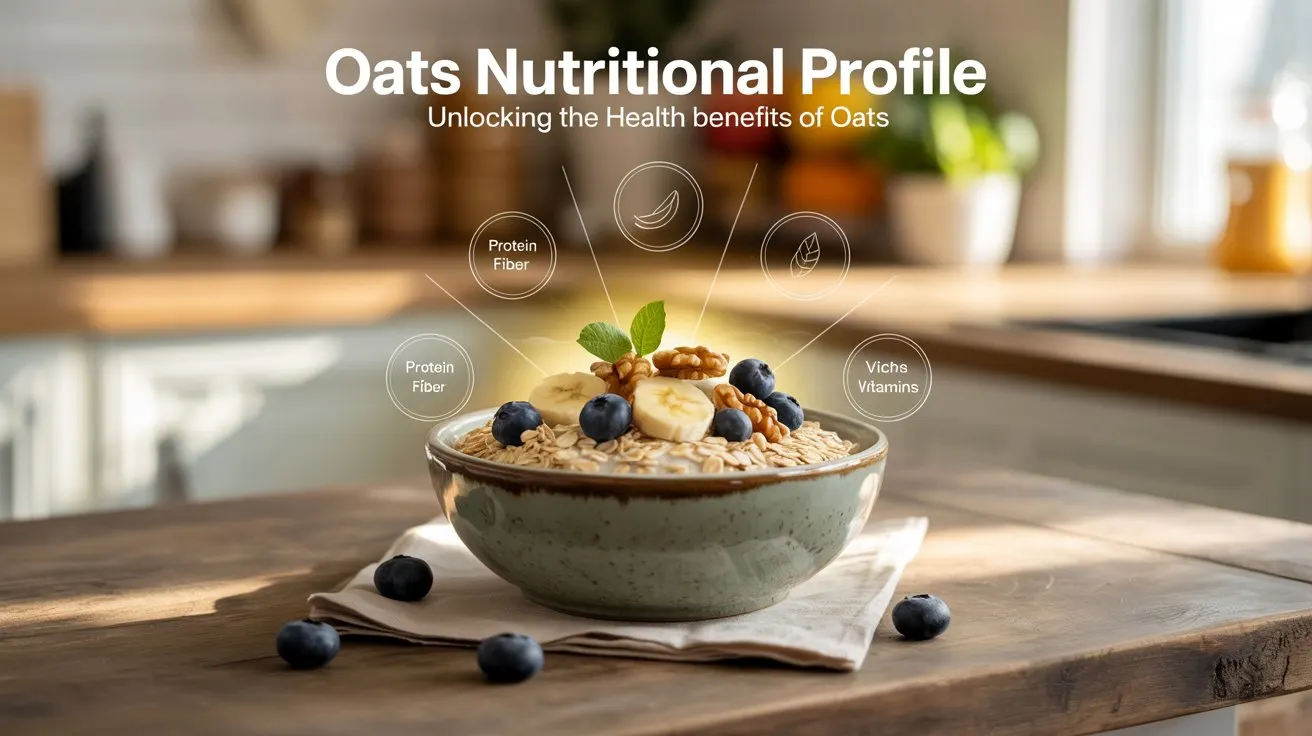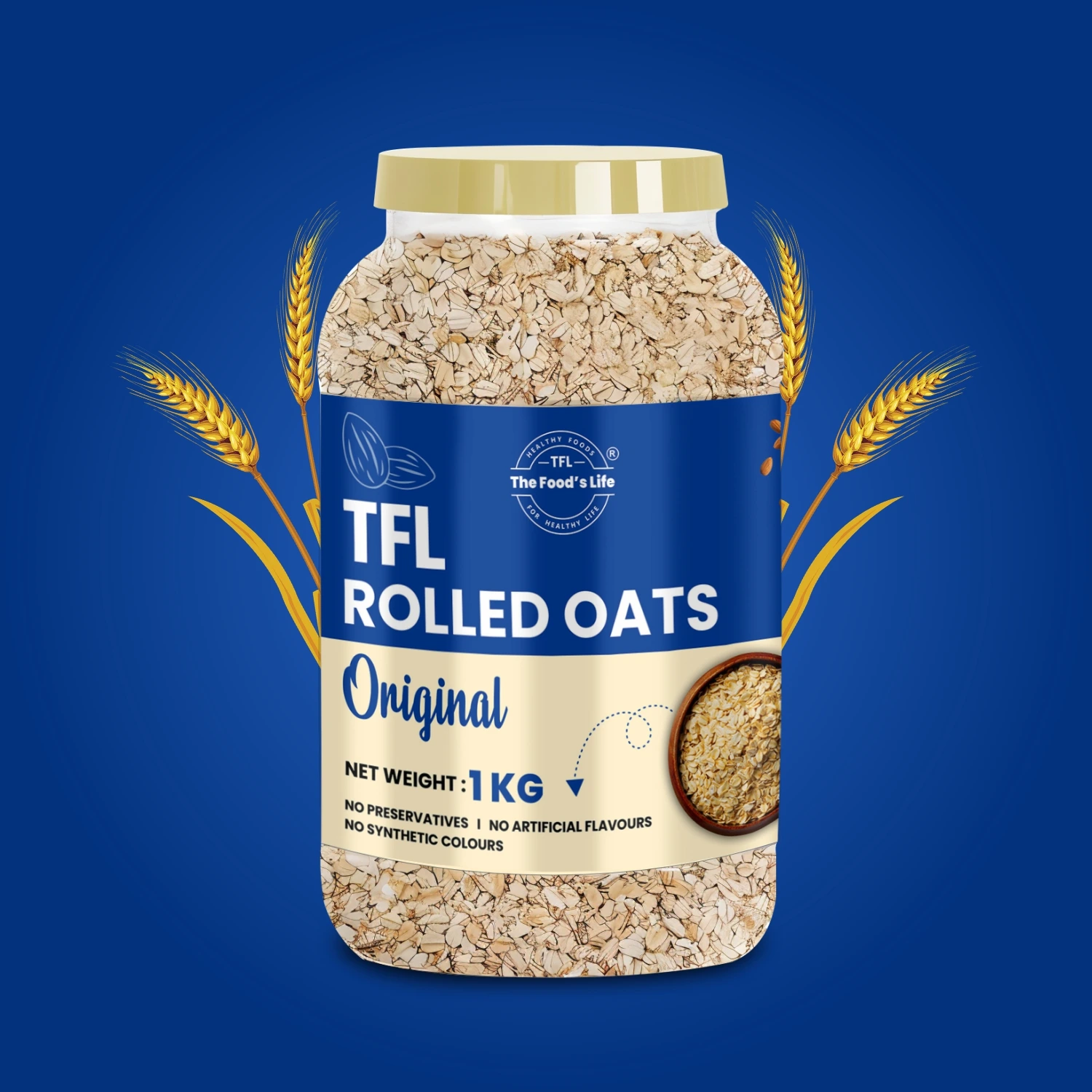Oats are packed with nutrients and are an important part of a healthy diet. Oats' nutritional profile contains a lot of fiber (in particular, beta-glucan, which promotes heart health and aids in digestion) and is a source of complex carbohydrates (allowing for increased energy through the day). Oats are also a source of vitamins and minerals (B1, magnesium, iron, and zinc) that each promote overall health and wellness.
In addition to oat's nutritional profile, oats are a nutritious option that support weight management by creating feelings of fullness, while also regulating aspects of blood sugar control. The fiber and protein in oats help to positively affect digestion and metabolic function, which makes oats great for improving metabolism. Oats are a flexible option to meet dietary needs and can be used for oatmeal as well as in baked goods and cooking.
The Nutritional Profile of Oats: Understanding Their Health Benefits
Oats are tasty and versatile, but they also have a strong nutritional punch. Because of their comprehensive nutrients, they are considered a superfood and may support overall health and wellness. By including oats in your diet, you can experience everything from supporting heart health to enhancing digestion. Let’s look at the important nutrients in oats and how they contribute to the many health benefits.
Key Vitamins and Minerals in Oats
Oats are high in many important vitamins and minerals, which add to their overall nutritional benefits.
- B Vitamins: Oats are an excellent source of B vitamins, such as folate, niacin (vitamin B3), and B6. These vitamins help increase your energy levels and brain function, as well as metabolic functions in your cells. These vitamins are important in converting food into energy while maintaining cellular functions.
- Iron: Oats are good sources of iron. Iron is important for red blood cell development and oxygen distribution in the body, and means oats are excellent food option for iron initiators.
- Magnesium: Another important mineral in oats, magnesium helps support muscle and nerve function, regulates blood sugar levels, and supports bone health while decreasing the risk of heart disease.
- Phosphorus: Oats also provide phosphorus, which is essential for your bone and teeth health.
These vitamins and minerals, work together to produce many additional health benefits, including, but not limited to, energy production, metabolism and wellness.
Protein and Fiber Content in Oats
Oats are especially known to be high in protein and fiber, providing a food great for those who want to keep or improve their health.
- Protein in Oats: Oats provide a good source of plant based protein, which is important for muscle repair, immune function, and growth. The protein in oats helps you to stay full longer, while also helping with overall metabolic functions.
- Fiber in Oats: Oats are a good source of soluble and insoluble fiber. Soluble and insoluble fiber provide many health benefits such as gut health, weight loss, and blood sugar regulation. The soluble fiber in oats is beta-glucan, which can lower cholesterol levels and risk for heart disease.
- Beta-Glucan: Beta-glucan is a specific type of soluble fiber in oats that can lower LDL cholesterol (colloquially known as "bad cholesterol"). When oats lower cholesterol, they provide heart health and improved overall cardiovascular function.
Antioxidants and Phytonutrients in Oats
Oats are also a source of antioxidants and phytonutrients that help improve health.
- Oats contain avenanthramides: which are unique antioxidants with anti-inflammatory effects. Avenanthramides help reduce inflammation, help blood vessel function, and may help reduce the risk of heart disease. They also offer protection from oxidative stress, which damages our cells.
- Oats contain polyphenols: which are plant compounds with antioxidant effects. Polyphenols help protect our body against free radicals, which can contribute to chronic diseases, aging, and inflammation.
- The antioxidants and phytonutrients: in oats help support not only heart health but immune function, skin health and overall health.
Oats and Heart Health: How This Whole Grain Supports Cardiovascular Wellness
Oats are not only a flavorful and filling breakfast food but they are also a great food for heart health. Oats consist of nutrients that support the cardiovascular system like fiber, antioxidants, vitamins, and minerals. Oats, especially the soluble fiber in oats, are important for maintaining heart health by helping with not only lowing cholesterol, but also regulating blood pressure and reducing inflammation. Below we will look at how oats are beneficial to maintaining your heart health and cardiovascular health.
Beta-Glucan in Oats and Its Impact on Heart Health
Beta-glucan is one of the more popular nutrients in the nutritional profile for oats and is a soluble fiber that is known to be able to be beneficial in heart health. Beta-glucan lowers low-density lipoprotein cholesterol (LDL), also known as bad cholesterol. Beta-glucan actually binds to the cholesterol in the digestive system and makes it so it does not get absorbed into the bloodstream. Therefore, it lowers overall cholesterol.
Key Points:
- Beta-Glucan in oats lowers LDL Cholesterol.
- It helps lower the plaque buildup in arteries which is good for arterial health.
- Eating oats regularly may reduce your risk of heart disease by maintaining cholesatoral levels in a normal range.
The oats nutritional profile and Cholesterol Control
Oats and Blood Pressure Regulation
Oats also help in blood pressure regulation along with cholesterol reduction. The magnesium and potassium in oats are needed for blood pressure regulation. Potassium is noted for being able to counteract the level of sodium in the body as well as improving the functioning of the heart. The kill the key ingredient being potassium which assists with the opening or relaxation of blood vessels, therefore, they aid in maintaining blood pressure in a healthy range.
Key Points:
- Potassium and magnesium in oats help relax blood vessels which may reduce blood pressure levels.
- Oats are low in sodium, therefore, it is a naturally healthy food for someone that has high blood pressure as well.
- Regularly consuming oats will help maintain blood pressure without hypertension.
The Power of Oats for Energy: A Boost for Your Daily Routine
Oats can be one of the most energizing and versatile additions to your diet. Oats are well known for their nutritional profile, and they boast of a healthy balance of carbohydrates, protein, and fiber, which can help fuel your body throughout the day. If you want sustainable energy for your workout or to have a nutritious start to the day, oats are one of your best options. Now, we can take a look at how oats can provide energy when you need it, whether it is day-to-day, or when working toward your fitness goals.
Carbs, Protein, and Fiber: Oats as an Energy Source
Oats provide a great source of energy that can be trusted because of the rich nutritional profiles of oats. Complex carbohydrates are the primary macronutrient in oats, which are digested slowly, providing you a consistent slow-releasing source of energy. The slow digestion can help keep your blood sugar levels devote you a longer time without crashing. Oats also contain protein, another macronutrient that helps repair and build muscle. Lastly, we have fiber, which helps with digestion and another layer to your overall energy efficiency.
Fiber and Protein for Sustained Energy
Oats have a unique nutritional profile that means a lot of protein and fiber. Both fiber and protein are very important macronutrients associated with generating longer lasting energy. Fiber (especially soluble fiber) helps slow the digestion of carbohydrates, and thus provides a slow supply of energy to the body. Protein helps your body maintain strong and efficient muscle tissue. Together, protein and fiber in oats help prevent the sudden energy spikes and subsequent crashes that are seen when eating too much sugar.
Key Points:
- Fiber in oats slows the release of energy, preventing blood sugar spikes and crashes.
- Protein helps maintain satiety and provides energy for muscle contractions.
- Fiber and protein in oats are a remarkable combination for continuous energy throughout the day.
Oats as a Pre-Workout Fuel
Oats are a great food to consume as a pre-workout meal due to the nutritional profile of oats. The combination of complex carbohydrates and fiber in oats provides long burning energy, making them a good food to feed your body before a workout. Eating oats before the workout helps keep a continuous stream of glucose to our muscles, helping to delay fatigue during activity. The protein in oats supports muscle repair and recovery after activity.
Takeaways:
- Oats provide continued energy throughout a workout, leading to better endurance and performance.
- The complex carbohydrates in oats provide muscles a fuel source during activity without causing a rapid blood sugar spike.
- Eating oats pre-workout can help with muscle repair and recovery by still providing protein.
How to Incorporate Oats into Your Diet for Maximum Health Benefits
are one of the most nutrient-rich and versatile foods you can add to your diet. Whether you are interested in heart health, losing weight, or digestion, incorporating oats into your meal plan will provide an abundance of nutrients that no other food can provide. Oats are rich in complex carbohydrates, fiber, and protein, giving the body stable energy while still providing health benefits. Here's a way to easily add oats into your diet for maximum health benefits.
Easy Ways to Enjoy Oats for Optimal Nutrition
Oats have a great nutritional profile that is loaded with fiber, protein, and healthy fat. They are a wonderful food for any meal, at any time of day. Here are some simple ways to integrate oats into your daily diet:
- Oatmeal: Oatmeal is a great way to enjoy oats and is a fantastic breakfast option. All you need to do is add water or milk to it and add your favorite toppings like fruit, nuts or seeds.
- Overnight Oats: You can make your oats the night before for breakfast the next day. All you add is yogurt, possibly, fruit, nuts and you have a healthy balanced breakfast choice.
- Oat Smoothies: If you want to pack oats into a smoothie, you can simply blend them into your favorite smoothie to add creaminess and additional fiber.
- Baked Oats: For a heartier option, you can bake oats with fruit or spices to make a substantial breakfast or snack.
Baking and Cooking with Oats
Oats are an easy way to increase fiber and improve nutrition in foods when baking, while also creating a delicious treat. Due to the nutritional characteristics of oats, they have several benefits as baked goods. They can help to improve heart health, enhance digestion, and provide sustained energy that may last throughout the day. Consider these options when baking with oats:
- Oat Flour: Oat flour can replace a portion of the regular flour in a recipe, resulting in a delicious gluten-free option when baking. Oat flour works really well in muffins, pancakes, and cookies.
- Oatmeal Bars: As a healthy alternative to snack bars purchased at a grocery store, oat, nut, and dried fruit bars are quick to make, and an excellent on-the-go nutritious snack.
- Granola: Make homemade granola with oats, honey, nuts, and seeds; it makes a crunchy and nutritious topping for yogurt or stand-alone snack.
- Savory Dishes: Oats can also be used in savory recipe as in oat risotto or you can also add oats to a soup for additional texture and fiber.
Adding Oats to Snacks and Sweets
Snacking on oats is an easy way to add to your nutrition throughout your day. Oats have such a great nutritional profile; therefore, they provide a great base for healthy and energy-boosting sates. Here are some unique suggestions for adding oats to your snacks and desserts:
- Oatmeal Cookies: Make oatmeal cookies by adding oats, dried fruits, nuts, and a little honey or maple syrup
- Energy Balls: Combine oats with peanut butter, honey, and a little protein powder, and you will enjoy these energy balls as a great snack to get you through your work day.
- Oat Smoothie Bowls: Just add oats to your smoothie when you mash it all up, then top with fruits and nuts to give you some added texture and fiber.
- Oatmeal Pudding: Combine oatmeal with chia seeds, almond milk, and your favorite sweetener for a great pudding style snack.
FAQs
Q1. What is the nutritional profile of oats?
Oats are a rich source of complex carbohydrates, fiber (especially beta-glucan), protein, healthy fats, vitamins (like B-vitamins), and minerals (such as iron and magnesium). This combination supports overall health, boosts energy, and promotes digestion.
Q2. How do oats benefit heart health?
Oats are heart-healthy because they contain soluble fiber (beta-glucan), which helps lower cholesterol levels, reduce blood pressure, and improve overall cardiovascular health.
Q3. How does the nutritional profile of oats support weight management?
Oats are high in fiber and protein, which contribute to increased satiety, helping you feel fuller longer. This can reduce overall calorie intake, support healthy weight management, and stabilize blood sugar levels.
Q4. Can oats improve digestion?
Yes, oats are an excellent source of soluble fiber, which supports gut health by promoting regular bowel movements, easing constipation, and encouraging the growth of beneficial gut bacteria.
Q5. How often should I eat oats for optimal health benefits?
For optimal health, aim to include oats in your diet 3-5 times a week. Consuming them regularly can support heart health, digestion, weight management, and overall well-being.
Conclusion: Embrace Oats for a Nutritional Boost and Healthier Lifestyle
Oats are not just a handy option for breakfast; they are nutrient dense, containing all the components of a healthy diet that can be beneficial for your health, in general. Oats are a good source of fiber, protein, vitamins, and minerals, offering health benefits including heart health, digestion, weight management, and energy level boosting. They have substantial health benefits; all of which can enhance your possibilities as long term health. Incorporating oats into your diets everyday menus of food may seem daunting, unless you are eating oatmeal for breakfast. You may include oats in your smoothies, or baked goods and have nutrition that warrants long term health, more so at each eating occasion. Lets consider how to approach oats more as a food which is flexible, healthy and nutritious. You may skip the oatmeal for breakfast, but make oats a part of your nutrient dense diets.






